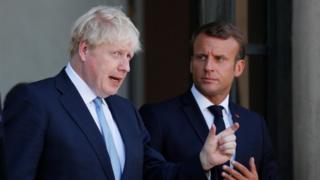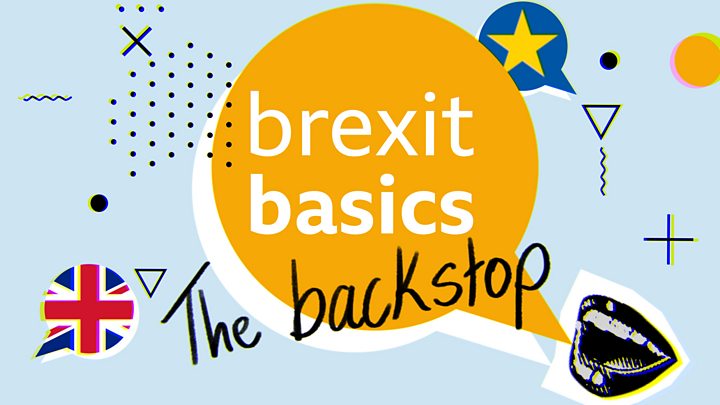Macron: EU Brexit deal decision ‘at end of the week’
The EU will evaluate then whether a deal is possible, the French president tells Boris Johnson. …

 Image copyright Reuters
Image copyright Reuters The EU will decide at the end of next week whether a Brexit deal is going to be possible, French President Emmanuel Macron has told Boris Johnson.
He said talks should proceed swiftly in coming days to see if anything can be agreed that “respects” EU principles.
It comes after the UK prime minister set out his Brexit proposals last week.
He says the UK will leave on 31 October with or without a deal, despite a law forcing him to request an extension if no deal is agreed by the 19th.
The prime minister discussed his proposals with Mr Macron by phone ahead of a crunch few days of negotiations.
An Elysee official said: “The President told [Mr Johnson] that the negotiations should continue swiftly with Michel Barnier’s team in coming days, in order to evaluate at the end of the week whether a deal is possible that respects European Union principles.
Earlier Mr Johnson claimed his plans had gained support in Parliament.
Talks are due to resume on Monday as both parties try to find a new agreement in time for a summit of European leaders on 17 and 18 October.
But arrangements for preventing a hard border on the island of Ireland continue to be a sticking point, with the EU calling for “fundamental changes” to the UK’s latest proposals.
Writing in the Sun on Sunday and the Sunday Express, Mr Johnson said his untested plan to use technology to eliminate customs border checks would take the UK out of EU trade rules while respecting the Northern Ireland peace process.
“I say to our European friends: grasp the opportunity our new proposal provides. Join us at the negotiating table in a spirit of compromise and co-operation,” he said.
He claimed MPs from “every wing of the Conservative Party”, Northern Ireland’s Democratic Unionist Party and from Labour have said “our proposed deal looks like one they can get behind”.
Under the Benn Act, passed last month, the prime minister must write to the EU requesting a Brexit extension if no deal is signed off by Parliament by 19 October, unless MPs agree to a no-deal Brexit.
Government papers submitted to a Scottish court said that Mr Johnson will comply, despite his assertion that there will be “no more dither or delay”.
Mr Johnson did not explain how the government would comply with the Benn Act.
Earlier, Irish Prime Minister Leo Varadkar said he believed a deal was possible but said the current proposals could not yet “form the basis for deeper negotiations”.
Meanwhile, speaking on the BBC’s Andrew Marr Show, Brexit Secretary Stephen Barclay said talks were under way with Labour and other opposition MPs aimed at securing their support for a new deal.
He said ministers were “considering” the idea of putting the PM’s proposals to a vote in Parliament to test support for them ahead of the EU summit.
What are the PM’s border plans?
Under Mr Johnson’s proposals, which he calls a “broad landing zone” for a new deal with the EU:
- Northern Ireland would leave the EU’s customs union alongside the rest of the UK, at the start of 2021
- But Northern Ireland would continue to apply EU legislation relating to agricultural and other products, if the Northern Ireland Assembly approves
- This arrangement could, in theory, continue indefinitely, but the consent of Northern Ireland’s politicians would have to be sought every four years
- Customs checks on goods traded between the UK and EU would be “decentralised”, with paperwork submitted electronically and only a “very small number” of physical checks
- These checks should take place away from the border itself, at business premises or at “other points in the supply chain”
Also on the Andrew Marr show, Shadow Attorney General Shami Chakrabarti said the prime minister “speaks with forked tongue” on the possibility of asking for an extension, adding he “seems to think he is above the law”.
She insisted there were no loopholes in the legislation, adding that the conditions under which the PM must ask for another Brexit delay were “explicit and specific”.

Media playback is unsupported on your device




